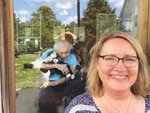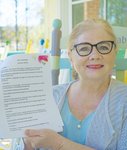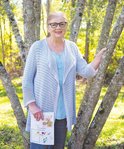


On her dad’s 92nd birthday, Liz Lahti spent half an hour with him through the window of his assisted living facility in Raleigh.
The day marked a series of milestones beyond John Cabot Diller Jr.’s Aug. 12 birthday: it was the first time she’d seen her dad and the first time he was Hoyer lifted into his wheelchair since COVID-19 restrictions were put in place in March. After his birthday, Lahti would see her dad one more time when restrictions were lifted, this time face-to-face, before a series of positive coronavirus cases hit the facility.
“He didn’t even recognize me with a mask on,” Lahti said of the visit. “COVID-19 has been extremely difficult. I can’t see him, and I am trusting his total care over to a facility.”
Lahti, who is the senior center manager at the Council on Aging’s Eastern Chatham Senior Center, joins millions across the country as a caregiver — a 24/7 role. Before the pandemic, Lahti was with her dad more days than not, to check his mail, sit with him at meals, do exercises with him and trim his mustache. It’s a level of attention that has earned her the nickname “Mother Hen” from her father. And that role doesn’t stop just because she can’t see him in person.
“My roles in the past and present include being an advocate, advisor, companion, shopper, personal care assistant, wardrobe planner, room decorator, exercise instructor, masseuse, mail reader, financial assistant, meal provider, calendar reminder, appointment setter, mood lifter, laundress, communicator, spy,” she said. “It’s a difficult job, but it is a privilege to be entrusted with this role.”
The Chatham County Board of Commissioners joined the state last month in recognizing November 2020 as Family Caregivers Month, calling on the people of Chatham to join the Council on Aging in honoring and supporting family caregivers. That support is necessary, said the Council on Aging’s Susan Hardy, because being a caregiver is a hard and potentially isolating job.
“A caregiver is someone who devotes 24 hours a day caring for a loved one,” Hardy said, adding that this makes it hard for caregivers to find time for themselves. “This does not necessarily mean that they are present in the home with the loved one, but they carry the weight of worrying about that person almost every minute of the day. In many cases, this means the caregiver neglects their own health because he/she is so busy trying to deal with the changes in the health of their loved one.”
Hardy, who is the human services team leader and caregiver specialist for the Council of Aging, said COVID-19 has only emphasized those challenges. For many caregivers who live with the care recipient, the isolation is even greater as fear of spreading the virus leads to less visits from family and friends, and potentially even from home aides, who offer a much-needed reprieve for caregivers. For the caregivers who have placed their loved ones in a residential care facility, stress is compounded as COVID-19 restrictions prevent them from seeing and checking in on their loved ones.
One of the caregivers Hardy works with used to take his wife, who is living with dementia, to a local restaurant every day for lunch — the only social interaction he and his wife had with other people. Restaurant restrictions as well as concern over exposure to the virus have halted this outing, one that gave him much-needed support in his caregiving role, Hardy said. Another caregiver she works with enjoys talking to people as they walk by on the trail that runs by her backyard. It’s the only interaction she has all day with anyone besides her husband, who has severe memory loss.
“My work and time I spend at work has not slowed down,” Hardy said. “I have more and more caregivers calling in asking to be considered for meal deliveries. I have seen an increase in more male caregivers asking for help. More caregivers are reaching out to get incontinent supplies from us, since most of them are seniors and they are encouraged to avoid being around crowds due to COVID-19.”
The Council on Aging provides many services to support caregivers: in-home respite aides to give caregivers a break, caregiver support groups, in-home aides who can do more personal care tasks such as bathing and feeding, assistive equipment loan program and lists of local businesses and services providers caregivers can hire from. They also offer meal deliveries through Meals on Wheels and frozen and shelf stable meals, delivered on a weekly or bi-weekly schedule during COVID-19.
This month, the council will host its second virtual caregivers’ support group meetings, with each group limited to eight people. Hardy has also started driveway visits with her caregivers — one of which recently took place in the rain while the caregiver sat beside his wife at one end of the carport and she sat at the other end.
COVID-19 grants and funding allowed Hardy to add 10 more in-home respite aides to the council’s roster, which she said is important in helping loved ones to continue living at home. The funding also allowed her to increase emergency respite — required in cases like when a caregiver must unexpectedly travel or wishes to go on vacation.
“Our numbers statistically show that providing an in-home aide for the caregiver for as little as three hours once a week over time has allowed more loved ones to die at home instead of being placed in a facility,” she said. “This is testament to how the power of giving the caregiver a break to run errands or just have some ‘me’ time can help the caregiver to continue to care for their loved ones until the end.”
For Lahti, it was a difficult but necessary decision to move her dad to a facility after he broke his back in 2019, then didn’t improve after going to the hospital and rehab.
Last Thursday, he was diagnosed with COVID-19 — he’s been bedridden since January of last year and is on oxygen, but so far, Lahti said, he has not shown severe symptoms. Though she can’t see him in person, she can check in on him through the camera recently installed in his room and through his cellphone — when he answers it, that is.
One of the most challenging things, Lahti said, is that her dad has no conception of time, meaning she sometimes gets phone calls at work and all hours of the night, even as she doesn’t physically see him because of COVID-19.
“He would forget he called and then call again leaving me the same message over again and again — it would fill my voicemail up,” she said. “I did save the ones that ended in, ‘I love you so very much.’”
Reporter Hannah McClellan can be reached at hannah@chathamnr.com.